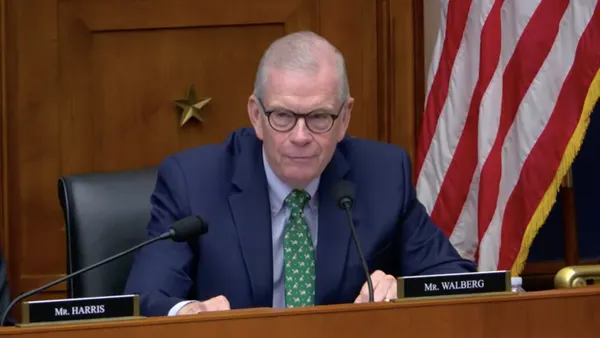Dive Brief:
-
The Biden administration's Title IX final rule protecting LGBTQ+ students hit its first major legal hurdle Thursday after a federal judge temporarily blocked it from taking effect in Louisiana, Mississippi, Montana and Idaho while a case against the regulations proceeds in court.
-
In Judge Terry Doughty's decision for the Western District of Louisiana, he said the anti-sex discrimination statute "was created to apply to two sexes," and that the changes to the interpretation of the law to include protections based on gender identity and sexual orientation were carried out in a "hurried and sloppy manner."
-
Doughty said the conservative states challenging the rule are likely to succeed on their claims. Those include that the department overstepped its authority in finalizing the rule and that the regulations violate Title IX, are an unconstitutional exercise of legislative power and are "arbitrary and capricious."
Dive Insight:
Schools are required to implement policies complying with the new Title IX rule by Aug. 1.
Cementing LGBTQ+ protections into Title IX regulations would likely impact issues like bathroom and locker room access for transgender students, preferred pronoun use, and book bans on LGTBQ+ topics — all issues that pose challenges for schools in conservative states with policies directly contradicting the federal interpretation of Title IX.
Many of the same states that have sued to block the Title IX final rule from taking effect have also guided their districts to disregard it as it works its way through the courts.
Schools in those states risk losing state funding if they follow the Title IX rule on one hand, and risk federal funding if they follow state laws on the other hand.
The Texas Education Agency, for example, warned in a June 13 letter that school districts and charter schools looking for state grant funding must "comply with the version of the regulations that have been in effect since 2020," which do not include LGBTQ+ protections.
The preliminary injunction, which maintains the status quo in the suing states, is the first response from the legal system after the U.S. Department of Education's April final rule triggered a round of lawsuits from at least 15 conservative states.
Doughty raised additional concerns in his opinion, including that the department didn't spell out details such as requirements for changing one’s gender identity or for addressing nonbinary students or "students with other gender identities."
"A 'gender fluid' person could possibly change gender identities every day or several times per day," Doughty wrote. "The Final Rule prohibits recipients from enacting common-sense rules to make sure the person who changed gender identities is sincere. Allowing a student to announce what gender they are, without requiring any supporting documentation, is arbitrary and capricious."
Doughty's court decision follows on the heels of another out of Texas on Tuesday that shot down guidance documents released in 2021 from the Education Department that interpreted Title IX to protect LGBTQ+ students. That guidance, which is still superseded by the 2024 final Title IX rule, is no longer in effect in over 20 conservative states.
It also comes the same day that Republicans on the House Committee on Education and the Workforce passed a resolution seeking to nullify the rule. However, Congress and Biden would also have to greenlight the resolution — which is unlikely.
Combined, however, the decisions pose hurdles for the Education Department's plans to cement protections based on sexual orientation and gender identity into regulation.
“We are reviewing the ruling," an Education Department spokesperson said in a statement responding to the preliminary injunction issued Thursday, adding that the department "stands by the final Title IX regulations." "The Department crafted the final Title IX regulations following a rigorous process to realize the Title IX statutory guarantee."













